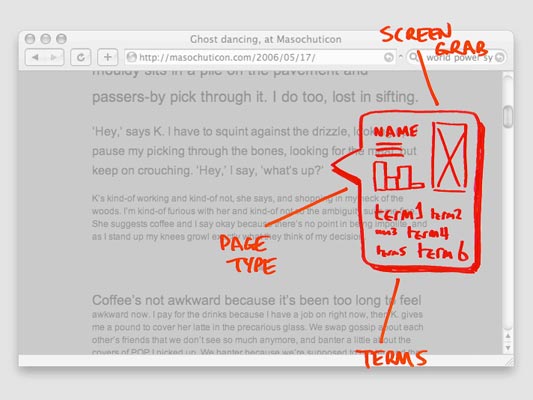It’s Friday, so let’s see what people have been saying about Pulse Laser…
An easier update first. I mentioned pagefeel, toying with taste, mouthfeel and extra browser functionality. Not only has Ben Gimpert put his culinary talk online, Theomatics of Food, he’s also offered more suggestions for what the browser-mouth could taste. All good stuff.
Now a slightly tougher comment.
Anne Galloway gave us a generous write-up on the first few days of posts, and asked some important questions of my model railway exhibition observations:
Matt’s assumptions about technology, and his expectations of technological progress over time, become very apparent in these excerpts. But what if the values these hobbyists associate with their craft include the beauty and nostalgia of keeping history alive? Or the joyous absorption of manual work and constant maintainance? What if there is a desire to resist automation and ease of use? What could we learn then about what people want and expect from new technological designs?
It’s true, it’s true!
Phil Edward’s comment on Anne’s post amplifies those questions, saying that they’re: “Pretty fundamental questions, in fact – and I dislike and distrust technophiles like Schulze and Webb (and Archigram, for that matter), precisely because they don’t ask them.”
And if that’s the side of us I’m showing, I’m doing something wrong!
I hope what generally colours our work is the preservation of existing practices. While I use technology more than most, I wouldn’t call myself a technophile. I like exploring the possibilities inherent in things, it’s true, and by making and using mainly–can I be a thingphile instead?
But there’s a specific point I should make about technology in the context of this hobby. Here, also, is where my post failed to give the full picture. Take Anne’s point about “keeping history alive.” It feels to me that, 20 years ago when I last went to an exhibition, that the history being kept alive was the railway. New technology went in the service of that modelling: electric points rather than manual points, lights inside trains, electric turntables. The technology felt contemporary, and it felt as if it had been kept contemporary for decades. Today, however, it feels like the history being kept alive is not that of the railway, but of the state of model railways from the late 1980s.
In short: It felt like the hobbyists used to chase technology in pursuit of their modelling more then than they do now, and that’s a big change.
Is this true? I have a low confidence in it, a tiny sample size, and a hazy memory so I don’t even know whether I’m remembering correctly. That’s why I didn’t discuss it… but omitting that comment was a mistake, as my surprise at the technology in play permeated the entire post without any explanation. It’s in that context the absence of computers and monorails stood out for me, not one of a general drive towards progress and automation. (I was as happy as many of the folks there just to watch the model trains move. The smaller the trains the better, for some reason.)
Anne, Phil, I hope this clarification leads to slightly less dismay!
